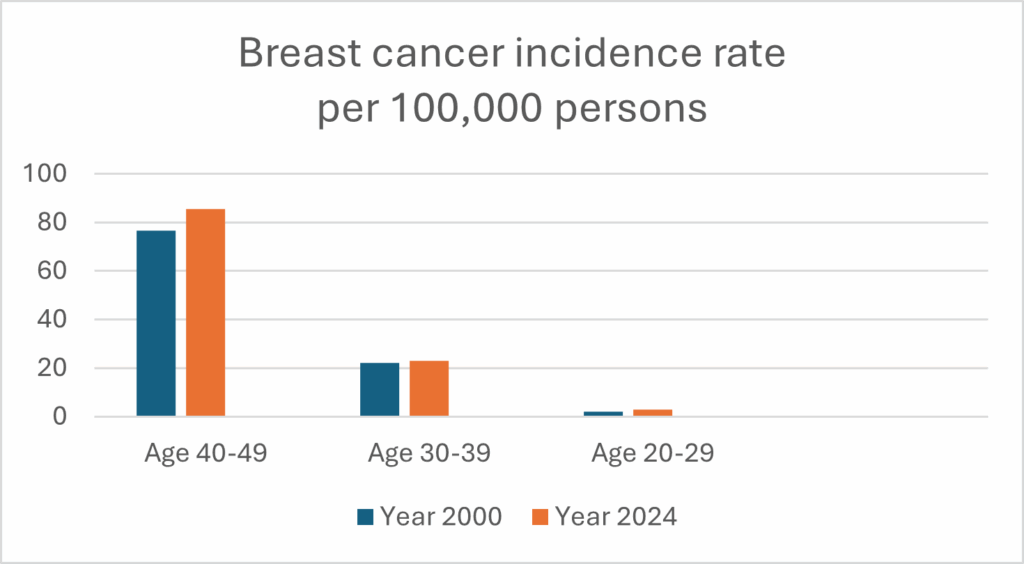- Research
- 2022-2026 Research Strategy
- Open Clinical Trials
- Closed Clinical Trials
- What is a Clinical Trial?
- Why Participate in a Clinical Trial
- Remote Telehealth Pre-Screening Process
- Research Achievements
- Publications
- Research Development and Funding
- Participating Institutions
- International Collaboration
- BCT Trials & Projects Summary
- Translational Research
- Clinical Fellowship Program
- International Fellowship Support
- Annual Scientific Meeting
- Travel Grants and Awards
- About
- Our Impact
- Fundraise
- Donate
- Researcher Login
- Cart
Are More Young Women Being Diagnosed with Breast Cancer?
Breast Cancer Trials invites you to our upcoming Q&A event—“Are more young women being diagnosed with breast cancer?”—a vital opportunity for the community to hear from leading experts and unpack emerging trends. This event will shed light on whether early-onset breast cancer is increasing and explore what this means for research and support services.
Other than being female, age is the most significant factor for developing breast cancer, with the average age that Australian women are diagnosed with this disease being 61 years. While breast cancer has traditionally been associated with older age groups, Cancer Australia has identified a notable rise in early‑onset cancers – those diagnosed in people aged 20 – 49 – including breast cancer.
In 2024, breast cancer is estimated to be the most common cause of death from cancer in women aged 20–39 years (Cancer Australia). Breast cancers in younger women are generally more aggressive and are diagnosed less often at early stages compared to menopausal women.
Approximately three women under 40 are diagnosed with breast cancer each day—a staggering statistic that underscores the urgency of awareness and early detection. Between 2000 and 2024, the incidence of breast cancer in women aged 30–39 climbed from 22.1 to 23.0 cases per 100,000, and in the 40–49 age group, from 76.6 to 85.6 per 100,000. (AIHW & Cancer Australia).
Young women diagnosed with breast cancer face unique challenges. They frequently encounter fertility concerns, early menopause, career disruption, and emotional distress – issues that demand tailored support and informed care strategies.
Additionally, in 2022 more than 10,000 Australian women of working age were diagnosed with breast cancer. A Monash University study estimates this will lead to $1.4 billion in lost wages over the next decade. On average, each woman diagnosed will lose the equivalent of 1.5 years of full-time work, showing just how deeply breast cancer impacts women’s lives and livelihoods (Monash University).
Despite rising diagnosis numbers, there have been significant improvements in survival rates. For women aged 20–39, the five‑year relative survival has soared from 76% in the late 1980s to 90% by 2014–2018 (AIHW).
Breast Cancer Trials currently has several clinical trials open to premenopausal women, which aim to improve patient outcomes and quality of life during treatment, as well as provide more treatment options to patients:
- OLIO: investigating a new treatment option for young women with the most common type of breast cancer.
- Neo-N Cohort C: supercharging treatment for triple negative breast cancer with dual immunotherapy.
- OPTIMA – Young: identifying if some patients may be able to avoid chemotherapy and the possible side effects from this treatment.
This Q&A event is designed to give voice to these vital conversations: understanding rising early-onset breast cancer trends, the impact of breast cancer on young women and their families, and the latest in clinical trials research. Join us to engage directly with experts, have your questions answered, and be part of a community advancing change.
Additional Resources:
- Cancer Australia: Evidence-based insights and statistics to improve our understanding of early-onset cancers.
- Cancer Epidemiology: The productivity burden of breast cancer in Australia.
- Monash University: Breast cancer costs Australian women and the wider community billions in lost work hours and wages.







